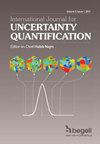A Bayesian Calibration Framework with Embedded Model Error for Model Diagnostics
IF 1.8
4区 工程技术
Q2 ENGINEERING, MULTIDISCIPLINARY
International Journal for Uncertainty Quantification
Pub Date : 2024-05-01
DOI:10.1615/int.j.uncertaintyquantification.2024051602
引用次数: 0
Abstract
We study the utility and performance of a Bayesian model error embedding construction in the context of molecular dynamics modeling of metallic alloys, where we embed model error terms in existing interatomic potential model parameters. To alleviate the computational burden of this approach, we propose a framework combining likelihood approximation and Gaussian process surrogates. We leverage sparse Gaussian process techniques to construct a hierarchy of increasingly accurate but more expensive surrogate models. This hierarchy is then exploited by multilevel Markov chain Monte Carlo methods to efficiently sample from the target posterior distribution. We illustrate the utility of this approach by calibrating an interatomic potential model for a family of gold-copper alloys. In particular, this case study highlights effective means for dealing with computational challenges with Bayesian model error embedding in large-scale physical models, and the utility of embedded model error for model diagnostics.用于模型诊断的内嵌模型误差的贝叶斯校准框架
我们研究了贝叶斯模型误差嵌入结构在金属合金分子动力学建模中的实用性和性能,我们将模型误差项嵌入现有的原子间势模型参数中。为了减轻这种方法的计算负担,我们提出了一个结合似然逼近和高斯过程代理的框架。我们利用稀疏高斯过程技术,构建了一个精确度越来越高但成本越来越高的代用模型层次结构。然后,多级马尔科夫链蒙特卡罗方法利用这一层次结构,从目标后验分布中高效采样。我们通过校准金铜合金系列的原子间势垒模型来说明这种方法的实用性。本案例研究特别强调了应对大规模物理模型中贝叶斯模型误差嵌入计算挑战的有效方法,以及嵌入模型误差对模型诊断的实用性。
本文章由计算机程序翻译,如有差异,请以英文原文为准。
求助全文
约1分钟内获得全文
求助全文
来源期刊

International Journal for Uncertainty Quantification
ENGINEERING, MULTIDISCIPLINARY-MATHEMATICS, INTERDISCIPLINARY APPLICATIONS
CiteScore
3.60
自引率
5.90%
发文量
28
期刊介绍:
The International Journal for Uncertainty Quantification disseminates information of permanent interest in the areas of analysis, modeling, design and control of complex systems in the presence of uncertainty. The journal seeks to emphasize methods that cross stochastic analysis, statistical modeling and scientific computing. Systems of interest are governed by differential equations possibly with multiscale features. Topics of particular interest include representation of uncertainty, propagation of uncertainty across scales, resolving the curse of dimensionality, long-time integration for stochastic PDEs, data-driven approaches for constructing stochastic models, validation, verification and uncertainty quantification for predictive computational science, and visualization of uncertainty in high-dimensional spaces. Bayesian computation and machine learning techniques are also of interest for example in the context of stochastic multiscale systems, for model selection/classification, and decision making. Reports addressing the dynamic coupling of modern experiments and modeling approaches towards predictive science are particularly encouraged. Applications of uncertainty quantification in all areas of physical and biological sciences are appropriate.
 求助内容:
求助内容: 应助结果提醒方式:
应助结果提醒方式:


